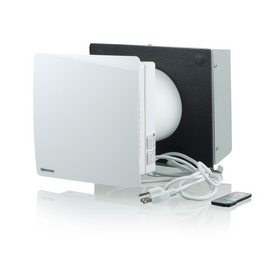
What Is CHBA Net Zero Home Certification?
Last Updated: Mar 17, 2025In 2016, the Canadian Home Builders' Association (CHBA) launched its own Net Zero Home Labelling Program. This program provides builders and consumers with a set of requirements for Net Zero and Net Zero Ready Homes, in addition to a list of builders and renovators who can build to these standards. This program has even garnered support from the federal government, which allocated 2.4 million dollars in 2020 to a CHBA initiative to demonstrate how you can build net-zero homes on a budget.
Table of Contents
- What Are the Benefits of CHBA's Net Zero Home Label?
- What Are CHBA Net Zero Certification's Main Areas of Focus?
- What Types of Homes Can Get CHBA Net Zero Certified?
- How Can a Building Professional Get Started with CHBA Net Zero Certification?
- How Can Homeowners Get a CHBA Net Zero Certified Home?
- How Can Net Zero Certifications Be Financed?
- Case Study: Absolute Zero by J. Zsiros Contracting Ltd.

This certification aims to provide a rigorous industry standard for innovative, energy-efficient homes across Canada that meet or exceed its energy goals. This certification aims to design and build homes with an energy performance that is 100% better than traditional homes built to code. While other net-zero certifications exist elsewhere, the CHBA Net Zero Certification is customized for the cold Canadian climate. CHBA Net Zero Homes are designed to be affordable, scalable, and appealing to Canadian residents.
What Are the Benefits of CHBA's Net Zero Home Label?
Net Zero homes are typically about 80% more energy-efficient than a traditional home. On-site renewable energy systems are implemented to produce the remaining energy needed. A Net Zero home works as a system to ensure superior indoor air quality and comfortable interior temperatures. These homes are tightly built and well insulated so that you will hear little to no outside noise.
Another benefit of a Net Zero home is the cost savings. The more efficient your home, the less you'll have to pay in utilities to heat and cool your home. There are other financial incentives for owning a Net Zero home as well. For example, Sagen provides a program that offers up to 25% of the mortgage insurance premium for borrowers that purchase a net-zero home.
Net Zero homes also allow you and your house to be more resilient. With a Net Zero home, you are not dependent on energy prices that vary significantly over time. During power failures, Net Zero homes can offer shelter since they require so little energy to operate. Some Net Zero homes can be off-grid, although most are connected. They supply power to the grid when producing more energy than they need and draw from the grid when required. The balance between the two achieves net-zero energy consumption, which is typically measured annually. Overall, homes built to CHBA's standards will help you reduce the environmental footprint of your home.
What Are CHBA Net Zero Certification's Main Areas of Focus?
CHBA Net Zero Homes have a significant focus on optimal energy performance. These homes take a holistic approach and are designed to have high-performance building envelopes that address thermal bridging, insulation values, and airtightness.
These homes also highly value the use of prefabrication and modular construction. Modular construction allows for increased construction productivity, reduced construction costs, and reduced construction schedules.
What Types of Homes Can Get CHBA Net Zero Certified?
The CHBA Net Zero certification is for both new construction and building renovations. The new construction certification program is primarily geared towards single-family homes and low-rise multi-unit residential buildings. Likewise, the renovation certification (currently in its pilot phase) caters towards single-family homes, semi-detached homes, and townhomes.
Since about 50 percent of Canadian homes were built before 1985, many homes are not very energy efficient. With a Net Zero certification catered towards existing homes, the existing housing stock can be completely reimagined. This certification offers a process for renovations in stages, which helps homeowners with costs. Some houses are better candidates for certification than others - and CHBA qualified Net Zero Renovators can help homeowners determine their homes' eligibility.
CHBA has developed a map that tracks builders and certified homes in Canada. To date, there are over 500 homes listed on this map, with the most significant concentration near Toronto.
How Can a Building Professional Get Started with CHBA Net Zero Certification?
If you are a builder and want to pursue a CHBA Net Zero Certification, the first step is to become a member of CHBA. After becoming a member, you will have access to the certification program requirements. The certification's technical requirements use the standards developed by the Department of Natural Resources Canada (NRCan) of the Government of Canada. All homes are designed to comply with local building codes and regulations.
The Canadian Home Builders' Association also provides training for individuals to become Net Zero builders, renovators, and energy advisors. To find out more about their training program requirements, visit their website.
How Can Homeowners Get a CHBA Net Zero Certified Home?
First, you will want to work with a Net Zero builder, renovator, or energy advisor. CHBA makes this process easier by providing a list of certified organizations and energy advisors to assist with your project.
It is important to note that the Net Zero Renovation Certification is currently in a pilot phase, after which developers will refine its requirements and process. The Net Zero Renovation Certification (for existing homes) can vary depending on your home's shape and needed upgrades.
Suppose you are building a home that you may like to certify as Net Zero in the future. In that case, you will want to design the house in a way that minimizes the energy it requires to operate. You will also want to include the potential for on-site renewable energy systems and orient the home to best take advantage of these.
How Can Net Zero Certifications Be Financed?
A finance tool called PACE (Property Assessed Clean Energy) allows homeowners in specific locations to make energy-efficient upgrades to their homes with no money down. Instead, these costs are absorbed by the property's municipal tax bills over time. This tool is available in Alberta, British Columbia, Nova Scotia, and other municipalities and regions in Canada. Individual jurisdictions may offer their own incentive packages as well.
Money Saving Home Improvement Products
Shop home improvement products that directly contribute to saving money through their use, whether through energy savings or lower maintenance costs.

Vents TwinFresh Comfo RA1-50-2 Ductless Energy Recovery Ventilator
Vents
In Stock

Stiebel Eltron Accelera 300 E Heat Pump Water Heater
Stiebel Eltron
In Stock

Emporia Classic Level 2 48 AMP EV Charger UL Listed
Emporia
In Stock
2 Colors

AFM Safecoat Almighty Adhesive Case of 12
AFM Safecoat
In Stock

Stiebel Eltron CON 300-2 Premium Wall-Mounted Convection Heater - 202030
Stiebel Eltron
In Stock

AFM Safecoat 3 in 1 Adhesive
AFM Safecoat
In Stock

Stiebel Eltron Accelera 220 E Heat Pump Water Heater
Stiebel Eltron
In Stock

Stiebel Eltron DHC-E 8/10-2 Plus Point-of-Use Electric Tankless Water Heater - 202145
Stiebel Eltron
In Stock

Stiebel Eltron CON 150-1 Premium Wall-Mounted Convection Heater - 202026
Stiebel Eltron
In Stock

Innovative Dehumidifier IW25-5 In-Wall Dehumidifier
Innovative Dehumidifier
In Stock

Case Study: Absolute Zero by J. Zsiros Contracting Ltd.
'Absolute Zero' by J. Zsiros Contracting Ltd. was a finalist for the 2020 CHBA National Awards. It is a stunning example of a net-zero home that prioritizes energy efficiency while creating a uniquely inviting space. This home, built in 2019, is an example of how you can achieve real energy efficiency on a limited budget.

There are many examples of energy-saving devices throughout the home with ENERGY STAR labeled appliances, showerheads, faucets, and toilets. The tight building envelope incorporates extra insulation and triple glazed windows to ensure comfortable temperatures year-round. The design includes a rain recovery system, a heat recovery ventilation (HRV) system, and locally sourced countertops. This home produces as much energy as it uses, and therefore, the owners have no energy bills.
Maria Saxton
Located in Roanoke, Virginia, Maria Saxton holds a Ph.D. in Environmental Design and Planning from Virginia Tech. She works as an Environmental Planner and Housing Researcher for a local firm specializing in Community Planning, Architecture, Landscape Architecture, and Historic Preservation. Her dissertation explored the environmental impacts of small-scale homes. She serves as a volunteer board member for the Tiny Home Industry Association.



